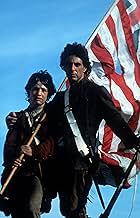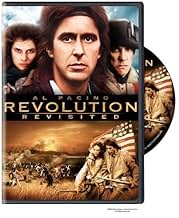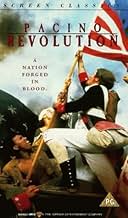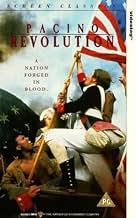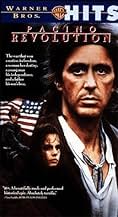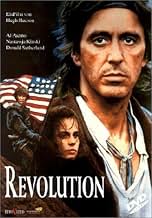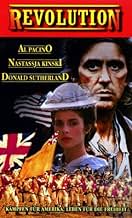IMDb RATING
5.3/10
7.9K
YOUR RATING
A trapper and his young son get pulled into the American revolution early as unwilling participants and remain involved through to the end.A trapper and his young son get pulled into the American revolution early as unwilling participants and remain involved through to the end.A trapper and his young son get pulled into the American revolution early as unwilling participants and remain involved through to the end.
- Awards
- 1 win & 4 nominations total
Cheryl Anne Miller
- Cuffy
- (as Cheryl Miller)
- Director
- Writer
- All cast & crew
- Production, box office & more at IMDbPro
Featured reviews
Sort of both a proto-PATRIOT (though mildly less-addlebrained) with reverse-elements of LAST OF THE MOHICANS (the Huron are the good guys this time around), this film covers the criminally underrepresented ground of the American Revolutionary War in a generally hackneyed way. I did like the recurrence of some elements in the film, such as how it was really "about" bonding with and protecting sons and how the careers of protagonist Pacino contrasted with oddly-cast British antagonist Sutherland. The two characters feel cartoonish at times as Sutherland carries out several heartless atrocities, exemplifying the un-nuanced way British are often depicted as villains, but he also impressively comes off like an honorable human being at the same time.
There's about as many baffling decisions on display as there are surprisingly good ones. What barely qualifies as a "love story" between Pacino and Kinski never makes sense and it's never clear why bougie but idealistic Kinski gets so enthralled with apathetic commoner Pacino. All of Kinski's scenes slow the film down along with many irritating scenes of Pacino getting wronged and stolen from left-and-right with him usually responding by angrily shouting at someone. The actual battle scenes come off very stiff and awkward, though to be fair that was generally the fighting style of the time.
I do give the film credit for actually recasting one of the characters as he ages instead of relying on goofy makeup or prosthetics. I also give it credit for the ending holding back on the most obvious way of concluding the narrative and reminding us that the characters in the film actually are supposed to be human beings. It is a bit baffling though that since the film was made in Europe with so much British money that they went with Donald Sutherland as the villain with a distracting accent. They could easily have cast any number of local British character actors of the day (say someone ike Anthony Hopkins, Paul Darrow, John Hurt, etc and the film would have been 50% better.
A good looking film with a couple nice surprises and believable production design, but unfortunately weighed down with too many flaws and pacing issues.
There's about as many baffling decisions on display as there are surprisingly good ones. What barely qualifies as a "love story" between Pacino and Kinski never makes sense and it's never clear why bougie but idealistic Kinski gets so enthralled with apathetic commoner Pacino. All of Kinski's scenes slow the film down along with many irritating scenes of Pacino getting wronged and stolen from left-and-right with him usually responding by angrily shouting at someone. The actual battle scenes come off very stiff and awkward, though to be fair that was generally the fighting style of the time.
I do give the film credit for actually recasting one of the characters as he ages instead of relying on goofy makeup or prosthetics. I also give it credit for the ending holding back on the most obvious way of concluding the narrative and reminding us that the characters in the film actually are supposed to be human beings. It is a bit baffling though that since the film was made in Europe with so much British money that they went with Donald Sutherland as the villain with a distracting accent. They could easily have cast any number of local British character actors of the day (say someone ike Anthony Hopkins, Paul Darrow, John Hurt, etc and the film would have been 50% better.
A good looking film with a couple nice surprises and believable production design, but unfortunately weighed down with too many flaws and pacing issues.
"Revolution" could have been a fascinating story. Unfortunately, it seems that director Hugh Hudson had shot his entire wad when he made the Oscar-winning "Chariots of Fire". Both "Greystoke" and this film were sloppy, choppy messes with no narrative flow. It is confounding, because it is obvious that there was a lot of attention to detail in parts of "Revolution". But only in parts. There is as much here that simply doesn't fit--the most glaring example being Al Pacino performance as a colonial trapper. He apparently forgot what movie he was in, and frequently uses a halting accent very similar to the one he used only two years earlier in Brian DePalma's "Scarface". And I don't think his character was supposed to be Cuban. The rest of the film produces the same effect you would get from flipping through a beautiful set of American Revolution postcards--at random.
It's 1776. France and England are in perpetual war. After the Declaration of Independence, British troops land in New York. Fur trapper Tom Dobb (Al Pacino) had lost most of his family. All he has left is his boat and his son. The revolutionaries confiscate his boat and they promise to pay him in gold in two weeks after the war is to end. His son Ned unwittingly signs up for the revolution and Tom is forced to join up to protect him. Daisy McConnahay (Nastassja Kinski) is the rebellious daughter of a rich New York family. She is drawn to the revolution and rebels against his war profiteering father. Sgt. Maj. Peasy (Donald Sutherland) is the ruthless English soldier who fights alongside his drummer boy son.
The son is the brattiest of brats. Pacino is Italian to his core. There is no way to alleviate that and his natural accent doesn't help. Kinski is foreign in her accent and annoyingly arrogant in her rebellion. Of course, her family is horribly selfish. The British are cartoonish. The revolutionaries don't start off well either. It's an ugly world overall. The only compelling work comes from Sutherland who knows how to play his uncomprising role without becoming a caricature. It is interesting to depict the rebellion start with such an ugly mob. Usually they're more noble than that. That has to be a part of the reason why this movie bombed so badly. There are also other pressing problems.
It's notable that the black actors barely speak a word. I'm sure the movie is trying to say a little something about slavery. In Philadelphia, the slaves are rising up as freedom rings out all around them but it's left confused. Obviously, none of them are freed in reality but it's not clear from the movie. I think the blacks being march off in the opposite direction is suppose to be them being sent into slavery in the south. I also have a problem with Pacino fighting off the two Indian scouts. It's barely believable and it would be easily solved if the friendly Indians arrive a minute earlier. They could help him kill the two Indian scouts. In addition, I don't understand why he doesn't go with his son at the end. He spends the entire movie rescuing his son but leaves him for the city life. That's stupid. I don't mind portraying the war as an ugly affair but this one is not that good.
The son is the brattiest of brats. Pacino is Italian to his core. There is no way to alleviate that and his natural accent doesn't help. Kinski is foreign in her accent and annoyingly arrogant in her rebellion. Of course, her family is horribly selfish. The British are cartoonish. The revolutionaries don't start off well either. It's an ugly world overall. The only compelling work comes from Sutherland who knows how to play his uncomprising role without becoming a caricature. It is interesting to depict the rebellion start with such an ugly mob. Usually they're more noble than that. That has to be a part of the reason why this movie bombed so badly. There are also other pressing problems.
It's notable that the black actors barely speak a word. I'm sure the movie is trying to say a little something about slavery. In Philadelphia, the slaves are rising up as freedom rings out all around them but it's left confused. Obviously, none of them are freed in reality but it's not clear from the movie. I think the blacks being march off in the opposite direction is suppose to be them being sent into slavery in the south. I also have a problem with Pacino fighting off the two Indian scouts. It's barely believable and it would be easily solved if the friendly Indians arrive a minute earlier. They could help him kill the two Indian scouts. In addition, I don't understand why he doesn't go with his son at the end. He spends the entire movie rescuing his son but leaves him for the city life. That's stupid. I don't mind portraying the war as an ugly affair but this one is not that good.
Many of the bad reviews of Revolution point out that it is dirty, filthy, disgusting, muddy, messy and uncomfortable to watch. True, true, true.
But... THAT'S WAR!
As a child I thought the American Revolution was the cleanest and most honerable war in history, fought by idyllic patriots on the side of freedom against snooty, smug king-lovers. That's how it was depicted in my childhood history books. But as I got older I realized that the books must have been glossing over something, because it seemed utterly illogical that a war could be so clean and honerable. Wars are desperate and horrible blood-soaked experiences that rip relationships apart, destroy everything, and are fought at ground level by the most uneducated people of all, many of whom really have no choice in the matter and are merely fighting for their own lives.
Revolution demythologizes the American Revolution by dismissing many of the ideal illusions we have about that war in particular. The hero is a self-serving man, who has no interest at all in war, but is forced to fight in it against his will. He's a free man who is forced into virtual slavery to fight for his freedom. Does this make him a bad man? No, he's an honest man who is out for number one, and is motivated mostly by love and loyalty to his son. The war steals everything from him, so why should he be happy about it? There are a few true 'patriots' in this movie, gung-ho idealists like Daisy, but almost everyone else is in the war for selfish motives, to profit from the war, to assert power, to avoid starvation, or for the pure joy of war itself. The redcoats are depicted as rowdy london street-toughs, who are no more or less ignorant & petty than the Americans, only more cocky and egotistical. Their uniforms are ill fitting and poorly miantained. This and a thousand other details give this movie the air of truth. By the end the victory of America is all the more sweet due to the wretchedness the victors must slog through. It's a very noble thing to see war depicted in such realistic ways.
This movie might be too grim to take if not for the great love story at the center of it. Its an entirely unique love story in the history of film, because it demonstrates how a relationship can continue to grow over time even if the lovers are separated from each other for long periods. Daisy and Tom have only a few minutes worth of conversations in the entire movie, and those represent ALL of their conversations. Basically they cross paths from time to time, but they are interrupted every time, and must leave each other, unsure when or if they will ever see each other again. So although they don't really get to know each other or go on dates or have any kind of normal courtship, they nonetheless fall in love, basically thinking about each other over the intervening periods. It is really the war that allows them to fall in love in the first place. Without the war these two people from opposite sides of the social spectrum would never have socialized, and without American freedom they would never have been able to stay together. But in the throes of war all the social rules are off, and these two are so desperate for something good to enter their lives, they fall in love. I don't know why this touched me so much, but it did.
I find this movie emminently re-watchable. I love it. In comparison, Mel Gibson's bad rip-off "the Patriot" is unwatchable to me. It is so full of moral absolutes and is so organized and visually beautiful, I think it does a disservice to the reality of war.
But that's my taste. I love almost every grim-reality war movie. Catch 22, The Victors & Das Boot, to name a few.
But... THAT'S WAR!
As a child I thought the American Revolution was the cleanest and most honerable war in history, fought by idyllic patriots on the side of freedom against snooty, smug king-lovers. That's how it was depicted in my childhood history books. But as I got older I realized that the books must have been glossing over something, because it seemed utterly illogical that a war could be so clean and honerable. Wars are desperate and horrible blood-soaked experiences that rip relationships apart, destroy everything, and are fought at ground level by the most uneducated people of all, many of whom really have no choice in the matter and are merely fighting for their own lives.
Revolution demythologizes the American Revolution by dismissing many of the ideal illusions we have about that war in particular. The hero is a self-serving man, who has no interest at all in war, but is forced to fight in it against his will. He's a free man who is forced into virtual slavery to fight for his freedom. Does this make him a bad man? No, he's an honest man who is out for number one, and is motivated mostly by love and loyalty to his son. The war steals everything from him, so why should he be happy about it? There are a few true 'patriots' in this movie, gung-ho idealists like Daisy, but almost everyone else is in the war for selfish motives, to profit from the war, to assert power, to avoid starvation, or for the pure joy of war itself. The redcoats are depicted as rowdy london street-toughs, who are no more or less ignorant & petty than the Americans, only more cocky and egotistical. Their uniforms are ill fitting and poorly miantained. This and a thousand other details give this movie the air of truth. By the end the victory of America is all the more sweet due to the wretchedness the victors must slog through. It's a very noble thing to see war depicted in such realistic ways.
This movie might be too grim to take if not for the great love story at the center of it. Its an entirely unique love story in the history of film, because it demonstrates how a relationship can continue to grow over time even if the lovers are separated from each other for long periods. Daisy and Tom have only a few minutes worth of conversations in the entire movie, and those represent ALL of their conversations. Basically they cross paths from time to time, but they are interrupted every time, and must leave each other, unsure when or if they will ever see each other again. So although they don't really get to know each other or go on dates or have any kind of normal courtship, they nonetheless fall in love, basically thinking about each other over the intervening periods. It is really the war that allows them to fall in love in the first place. Without the war these two people from opposite sides of the social spectrum would never have socialized, and without American freedom they would never have been able to stay together. But in the throes of war all the social rules are off, and these two are so desperate for something good to enter their lives, they fall in love. I don't know why this touched me so much, but it did.
I find this movie emminently re-watchable. I love it. In comparison, Mel Gibson's bad rip-off "the Patriot" is unwatchable to me. It is so full of moral absolutes and is so organized and visually beautiful, I think it does a disservice to the reality of war.
But that's my taste. I love almost every grim-reality war movie. Catch 22, The Victors & Das Boot, to name a few.
I've just seen "Revolution" on TV and I have to say that it's a much better movie than one may think. Sometimes a movie is worth-seeing only because of its wonderful production values. And "Revolution" is an eye-popping visual feat: wonderful cinematography, first-rate period details. I might say that beside Stanley Kubrick's "Barry Lyndon" and Tony Richardson's "Tom Jones", this is the most beautifully made period movie about the eighteenth century. "Revolution" is also an important film because there are only about a dozen films on the Revolutionary War and almost all of them are a matter of obscurity - at least for a Hungarian movie lover. The most popular is Roland Emmerich's "The Patriot" (2000). In my opinion that's a much worse film than Hudson's maligned film. When "Revolution" was released it was a critical and commercial disaster. I think it didn't fit in any of the movie trends of the 1980s. But in the future it might be regarded as a flawed but valuable movie. Its flaws are obvious and much-discussed so I don't want to speak about them. If you're interested in beautiful period pieces and the Revolutionary War you might like this movie.
Did you know
- TriviaWhen Annie Lennox's character sings a song near the end of the movie, her voice is dubbed.
- GoofsIn battle, the British soldiers are depicted taking short steps; in reality, Redcoats were trained to take long paces, so as to close the range quickly.
- Alternate versionsIn 2009, Hugh Hudson made his own director's cut titled "Revolution Revisited" which was also released on DVD. The new version featured new narration recorded by Al Pacino, a different ending, and removed 10 minutes of footage from the film.
- ConnectionsEdited into Give Me Your Answer True (1987)
- How long is Revolution?Powered by Alexa
Details
- Release date
- Countries of origin
- Language
- Also known as
- Revolution 1776
- Filming locations
- King's Lynn, Norfolk, England, UK(New York scenes)
- Production companies
- See more company credits at IMDbPro
Box office
- Budget
- $28,000,000 (estimated)
- Gross US & Canada
- $358,574
- Opening weekend US & Canada
- $52,755
- Dec 29, 1985
- Gross worldwide
- $358,574
- Runtime2 hours 6 minutes
- Color
- Aspect ratio
- 2.35 : 1
Contribute to this page
Suggest an edit or add missing content



